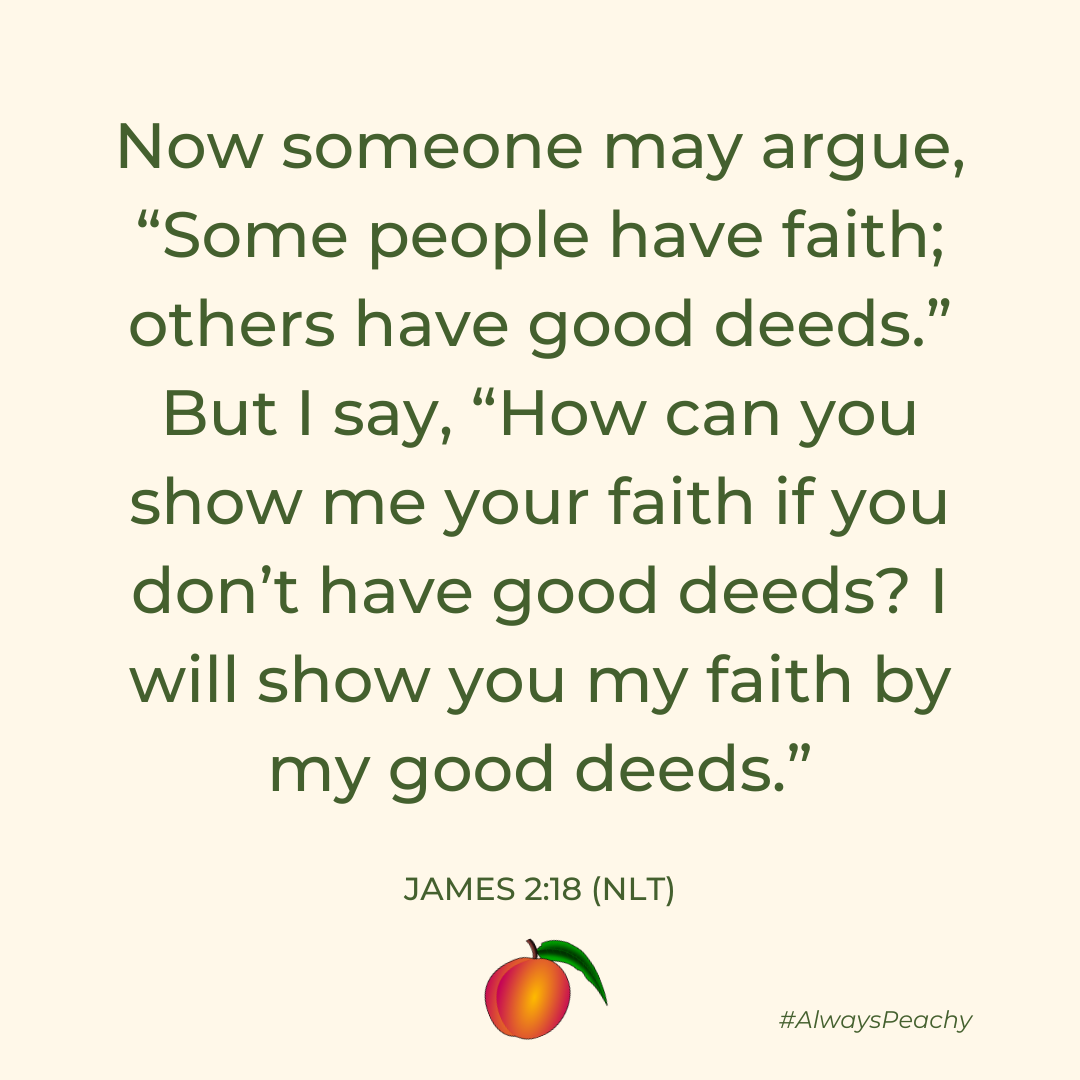Can I do what is wrong and still be saved?
May 6-10, 2024 | Always Peachy Devotionals | Book of James Week 2
Is Christianity based on our behavior?
That’s a common question people often ask. I’ve heard it a lot over the years, and to be honest, it can be a little confusing at times. Not because the Gospel is unclear, but because so much of what the average person understands of Scripture is taken out of context.
When working toward understanding any written material, context is king. You have to know the intended audience, the historical timeframe, and the purpose for the material. You can’t just cherry pick a sentence because it sounds good or poetic and expect to be able to understand the full picture of what’s being said.
That’s true of Shakespeare and Nietzsche and Socrates and Sun Tzu and Marcus Aurelius and anyone who ever wrote anything. That’s true of Scripture too.
If you think you can pick one Bible verse and understand everything about God and His plan and His will, well—it doesn’t really work that way. Too many Bible teachers have misled millions of people by picking and choosing verses that they can manipulate to support their personal point of view. Frankly, we’re seeing a massive movement in churches today where they are adjusting their interpretations of Scripture to fit what is currently popular in culture.
Even Satan used Scripture out of context to try to manipulate Jesus. Jesus fought back with Scripture in context.
So is Christianity based on our behavior?
I suppose it depends on your definition of Christianity, especially because in the world where we live today, “Christian” means many different things that it didn’t used to mean.
Can you earn your salvation through your actions? No.
Can you lose your salvation because of your actions? No. (If you couldn’t earn it in the first place, you can’t lose it. It’s a gift.)
But can your behavior call your faith into question? Yes. Absolutely.
This is where the disconnect often happens within Christian circles. If we don’t have to earn our salvation (we don’t), we shouldn’t have to prove that we truly believe. And, to a certain extent, I believe that’s true. If someone claims they know Jesus, I’m happy to believe them. At least, until they are in a position of authority where their behavior is adversely affecting the church (and the Church) as a whole. And even then, it’s not my place to judge whether or not a person’s heart belongs to Jesus. That’s between the person and God. I have nothing to do with it, and I am not anyone’s Holy Spirit.
God knows His people.
But within the church, within a ministry, within a body of believers, we have the responsibility (and the authority) to question the behavior of those who say they follow Jesus. God expects us to hold each other accountable. He wants us to encourage each other to live our lives in accordance with what the Bible says is true.
This hard-hitting chapter in James is where we’re going to park this week. (As you read this introduction, please pray for me.) In the early church, there were a lot of disparities in how people were behaving versus how they should have been behaving, and James addressed them. Ironically, the church hasn’t changed very much in the last 2,000 years.
Playing favorites (James 2:3-4)
Only one sin disqualifies you (James 2:10)
The law of freedom (James 2:12)
Mercy triumphs over judgment (James 2:13)
Faith without works (James 2:15-16)
Even in matters outside of spirituality, our behaviors are usually indications of a larger problem. So if you say you believe in Jesus but you don’t live like He did, do you really believe?
This chapter of James, as well as our memory verse for this week (James 2:18) isn’t about earning salvation; it’s about living a life that points to Jesus. It’s making lifestyle choices that bring God glory. It’s intentionally putting yourself in a position where God can bless you. It’s actively choosing to live in line with what you say you believe.
You can’t earn your salvation, but if you refuse to live your salvation, do you truly have it?
If you have faith in Jesus, it will show up in your life. Your faith should be obvious in your choices, in your speech, in your actions, in your politics, in your relationships, in every area of your life. Your faith should make you different.
If it doesn’t? It may be time to ask some more questions.
My prayer for all of us is that we truly grasp how much God loves us, that we can totally lean on His saving grace. And that we would understand what it looks like to live our faith every day.
Hugs!
Amy
Remember! These Sunday intro emails are free, but if you want the actual daily devotions, you need to subscribe:






